
CHRIS CAMPBELL Cesa’s School of Consulting Engineering offers online and in-person training and teaches skills including people management, financial management, contract management and interpersonal skills
There have been positive developments in the mining sector regarding health and safety standards, particularly with the establishment of the global industry standard on tailings management (GISTM), says industry body Consulting Engineers South Africa (Cesa) CEO Chris Campbell.
The GISTM relates to mine waste treatment and tailings facilities and emphasises the role of the Engineer of Record, who is responsible for the design and construction phases of a project.
He explains that tailings dams, if left unmaintained and unmonitored, can be a “recipe for disaster” because the consequences of a tailings dam wall failure is not unlike that of the “mudslides” recently witnessed in KwaZulu-Natal – making safety regulations, such as the GISTM, necessary.
Whil he agrees that stringent health and safety requirements are imperative, the standard procedures applied to professional service providers are sometimes “unduly onerous”.
He believes that, without compromising the risk management processes of mining sites, some level of optimisation could be applied on a case-by-case basis.
Other developments in the mining sector include the introduction of technology, with mining clients having been most receptive towards such innovation, Campbell says.
Examples of technology used in the industry includes software for the design and monitoring of facilities, software that has enabled the conducting of virtual meetings, as well as the use of drones used for aerial surveying of sites.
Skills Development
Mining companies have limited in-house skills to keep abreast of newer developments, such as implementing green energy solutions in the sector.
Hence, mining houses, service providers and government should assist in upskilling younger generations of engineers to adequately handle these new developments, adds Campbell.
While he encourages the greater marketing of engineering careers among the youth, he says there are a growing number of unemployed engineering practitioners, many of whom are recent graduates, likely caused by the general reduction in gross fixed capital investment by both government and the private sector.
He cautions that “we must be careful not to overgrow the pipeline because the industry is out of sync in terms of demand” and avers that “this should not be the case in a country where we are in short supply of engineering skills”.
To assist in upskilling engineers, Cesa established its School of Consulting Engineering in 2000 to provide engineering graduates and practitioners with skills that accompany the technical knowledge acquired during tertiary education programmes.
“The school provides a body of knowledge that emphasises aspects such as financial management and interpersonal skills, to assist in developing a well-rounded, business-minded, engineering and technical practitioner,” explains Campbell.
The school offers online and in-person training and has been successful to date, with graduates developing into company leaders and/or establishing their own companies.
The development of the school’s online offering was first explored in 2016 but has been accelerated since the onset of the Covid-19 pandemic.
Moreover, Cesa aims to strengthen the relationship between consulting firms and the mining industry by partnering with like-minded entities to allow for collaborative partnerships that maximise member benefits.
“The mining industry is an important aspect of the economy. By strengthening this relationship, both industries can learn from each other and maximise the value added by consulting engineering services,” concludes Campbell.